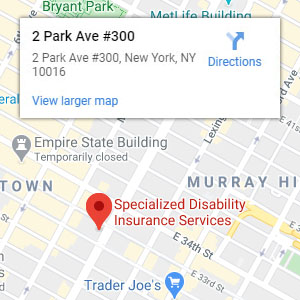Own Occupation
The policy can pay the full monthly benefit if due to injury or illness, you cannot work in your primary occupation. You can still collect the full monthly benefit if you earn income from another occupation, regardless of the level of earnings, as the benefit is not reduced or offset due to other income. Some carriers will offer more detailed language for medical specialties and some carriers offer multiple options for total disability definition.
Residual or Partial Benefits
Many claims are not totally disabling. A residual or partial rider can start paying you benefits if you’re still working in your specialty, but as a result due to injury or illness, you experience a loss of income. Generally, these benefits require a loss of income of at least 15% or 20% before your eligible to receive benefits. Based on the carrier, other qualifications may apply. These benefits allow you to protect your income and not get penalized if you want to or can still do some but not 100% of your job. This is a provision that can vary a lot from carrier to carrier.
Non-Cancellable/Guaranteed Renewable
This terminology means the insurance company cannot change your policy benefits, add new exclusions, or increase your rates. As the policy owner, you’re not required to keep the coverage or make your payments, but if you make your proper payments on time, the insurance company cannot modify your coverage, make you reapply, or change the rates, or drop you.
Future Increase Option/ Benefit Update (Ability To Increase Coverage)
These can be called terms such as future purchase option, future increase option, benefit update rider, or benefit purchase rider. The benefit allows you to increase your coverage in the future without going through medical underwriting. Therefore, if you locked in a policy and then wanted to increase your monthly benefit as your earnings grow, you can do it even if your health changes. Any health conditions that began after your policy will not be excluded or held against you unless stated otherwise.
Benefit Period
The maximum duration the insurance carrier would pay benefits. Generally, most individual contracts offer the following options, 2year, 5 years, 10 years, age 65, age 67, age 70. Depending on carriers, there may also be provisions that help pay benefits beyond age 70. The longer the benefit period, the high your premium.
Elimination Period
The duration of time you need to be out of work or with a loss of income to become eligible for benefits. Generally, most individual contracts offer, 30 days, 60 days, 90 days, 180 day and 365 day elimination periods. The Longer the elimination, the lower your premium.
Mental/Nervous Limitations
Depending on your occupation and the definitions desired, carriers may require a 24-month mental/nervous limitation. This means claims that results from events such as depression, drugs, alcohol, anxiety, burnout or mental illness could only be covered for up to 24 months regardless of your benefit period.
Cost of Living Adjustment (COLA)
COLA is a benefit that can increase your monthly payout during a claim. While there are multiple options, the goal is to increase your payment on an annual basis to protect you against inflation. This benefit can substantially increase the number of benefits you receive during a claim, especially if you’re in the early stages of your career.
Catastrophic Rider
This is an option that if selected, could pay you an additional payment for a more severe claim. The terms vary but this benefit is designed to pay more since a severe claim can be a more expensive claim and have a larger financial impact on the household.
Retirement Protection
While out of the claim, the insurance carrier would put funds into a trust that you can access and use in your retirement. This benefit helps protect the income you allocate to savings. Most don’t realize that if they get disabled, their expenses could be higher, and they might not be able to take advantage of funding certain retirement accounts.
Student Loan or Supplemental Riders
While out on the claim, the insurance carrier can pay you additional funds to help you pay off student loan debt.
*NOTE: These are not actual definitions found in contracts. The language in contracts will from contract to contract.
